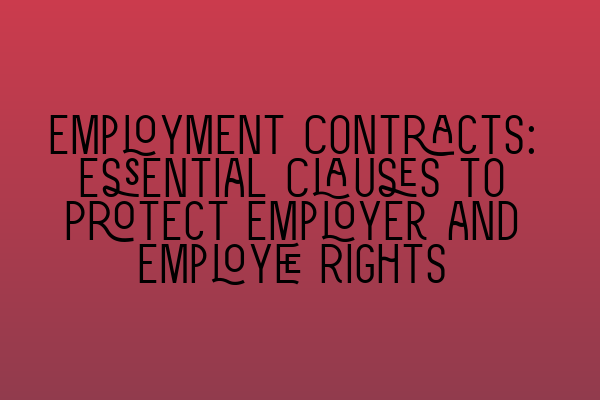Employment Contracts: Essential Clauses to Protect Employer and Employee Rights
Employment contracts serve as the foundation of the employer-employee relationship. These legally binding agreements outline the rights and responsibilities of both parties and provide a framework for the employment arrangement. By including essential clauses in employment contracts, employers and employees can protect their respective rights and ensure a fair and productive working environment.
1. Job Description and Scope of Work
The job description and scope of work clause clearly define the position and the tasks that the employee will be expected to perform. This clause helps prevent misunderstandings and ensures that both parties have a shared understanding of the employee’s responsibilities. It also provides a basis for evaluating performance and can be helpful in resolving disputes related to job duties.
For employees, a clear job description can provide security and clarity about their role within the organization. Employers, on the other hand, can use this clause to hold employees accountable for their assigned tasks and responsibilities.
2. Compensation and Benefits
The compensation and benefits clause outlines the details of the employee’s salary, bonuses, commission, or any other forms of compensation. It also includes information about benefits such as healthcare, retirement plans, vacation days, sick leave, and other perks. This clause helps set expectations regarding compensation and ensures that both parties are on the same page.
Employers should clearly state the employee’s salary, payment frequency, and any applicable bonus or commission structures in this clause. Employees, on the other hand, should review this section carefully to ensure that they understand their total compensation package and any additional benefits they are entitled to.
3. Work Schedule and Hours
The work schedule and hours clause defines the employee’s regular working hours and specifies whether they are expected to work overtime or be available for work outside of regular business hours. This clause is crucial for managing employee expectations regarding their availability and work-life balance.
Employers should clearly state the expected work schedule, any specific time-off policies, and whether the employee is entitled to overtime pay. Employees should review this clause to ensure they are aware of their working hours and any requirements for flexibility or overtime.
4. Confidentiality and Non-Disclosure
The confidentiality and non-disclosure clause safeguards the employer’s proprietary information, trade secrets, and other sensitive business information. This clause prevents employees from sharing confidential information with third parties, including competitors, during and after their employment.
Employers should clearly define what constitutes confidential information and highlight the consequences of violating this clause. This clause is particularly important for businesses that rely on proprietary technologies or strategies to maintain a competitive edge.
5. Intellectual Property Rights
The intellectual property rights clause clarifies ownership and rights to any intellectual property or inventions created by the employee during their employment. This clause ensures that the employer retains ownership of any intellectual property developed within the scope of the employee’s work.
By clearly stating the ownership of intellectual property, employers can protect their rights and prevent any disputes over ownership in the future. Employees should carefully review this clause to understand their rights and limitations regarding any intellectual property they may create during their employment.
6. Termination and Severance
The termination and severance clause outlines the conditions and procedures by which either party can terminate the employment contract. It also includes provisions for severance pay, notice period, and any restrictive covenants that may apply after termination.
Employers should clearly define the grounds for termination, notice periods, and any restrictions applicable to employees after termination, such as non-compete or non-solicitation clauses. Employees should review this clause to understand their rights in the event of termination and any obligations they may have after leaving the organization.
Conclusion
Employment contracts play a crucial role in protecting the rights and interests of both employers and employees. By including essential clauses that cover job description, compensation, work schedule, confidentiality, intellectual property, and termination, employers and employees can establish clear expectations and promote a fair and productive working relationship.
If you need assistance with employment contracts or want legal guidance in navigating contract law, contact SQE Contract Law. Our team of experienced solicitors can help you draft, review, or interpret employment contracts to ensure that your rights and interests are protected.
Related Articles:
